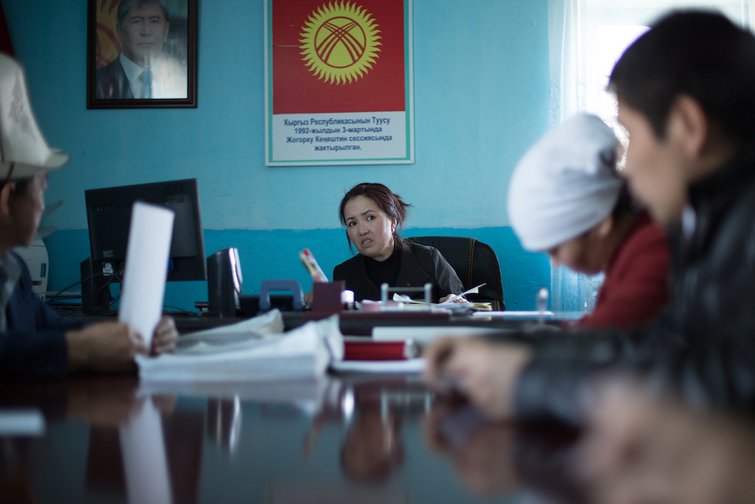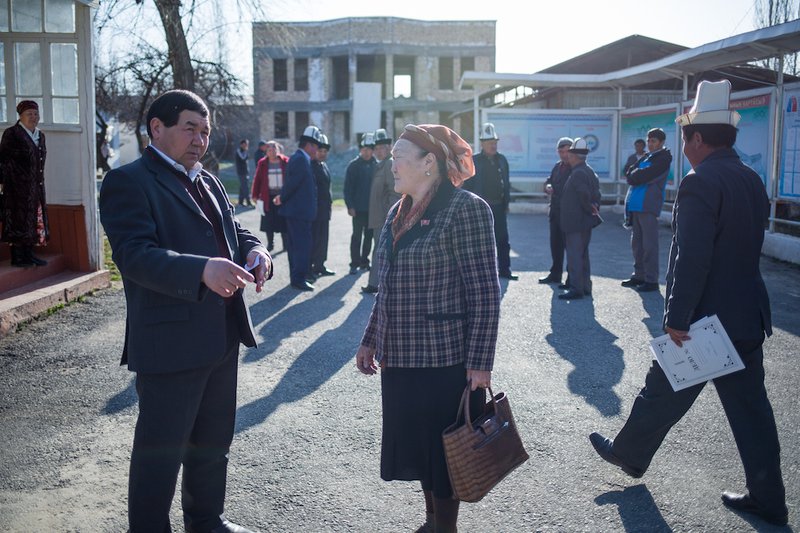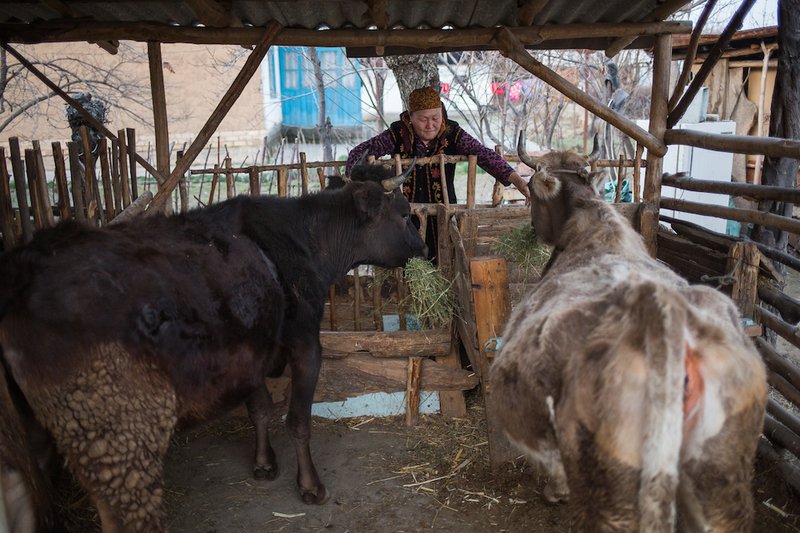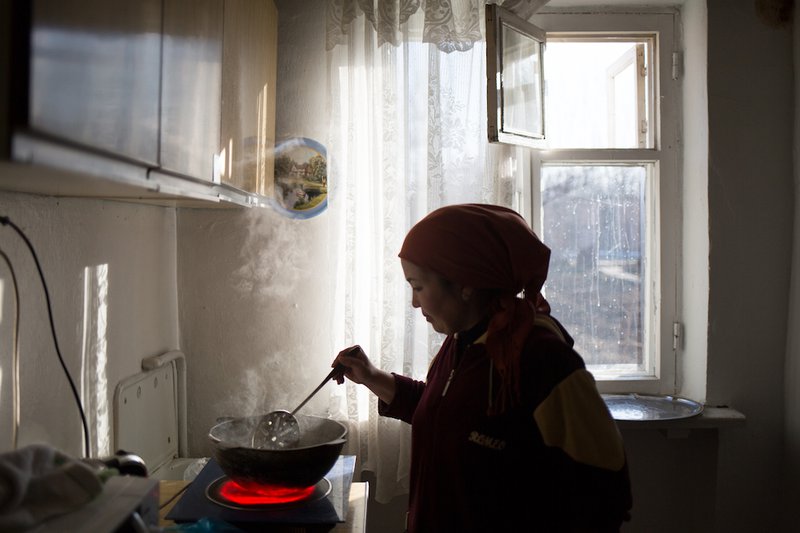No place for women in grassroots peace-building in Fergana Valley
In this part of Central Asia, where the borders of three countries meet, women are excluded from the vital work of peace-building. (c) UN Women/ Elyor Nematov. All rights reserved
(c) UN Women/ Elyor Nematov. All rights reserved 15 July 2020
15 July 2020“Peace-building is an opportunity to leave peacefully together with our neighbours. If our neighbours are peaceful, we are peaceful.” Thus spoke Bubusaliha - a resident of Kok Tash village in Kyrgyzstan’s Batken province that borders Tajikistan. “Living right at the border, conflicts and fights are unfortunately very common. They have seasonal character, and happen more often in springtime when there is shortage of water,” she adds. Bubusaliha is one of her community’s most respected women, yet she - like many other women - does not directly participate in decision-making and conflict resolution.
Cross-border conflicts in Fergana Valley, which is shared between Kyrgyzstan, Uzbekistan and Tajikistan, have been a fixture since the collapse of the Soviet Union. More than 12 border incidents and conflicts occurred in 2019 alone between residents of the border communities in Kyrgyzstan and Tajikistan, with four incidents resulting in casualties.
“Recently conflicts have continued throughout the year for various reasons. For example, there was a backlash over a road being constructed on disputed territory,” Bubusaliha reveals.

In general, women play a limited role in preventing, managing and resolving border incidents and conflicts in Kyrgyzstan’s side of the Fergana Valley. Existing gender inequalities and unequal power relations between men and women hinder the latter’s participation in matters of peace and security. A complex set of patriarchal norms continue to assign women to the role of caregivers in the household, where men remain the key decision-makers. As a result, when it comes to recognising women’s role in peace-building, the prevalent belief is that security-related issues are traditionally men’s responsibility, excluding women’s voices from discussions and negotiations.
A UN Women survey conducted in May 2019 with 150 women living on Kyrgyzstan’s side of the border, in which the author was involved, found that only 6% of them share their advice with their husbands while 7% organise cultural and sports events to promote tolerance in their communities.
Women do not see their role as engaging in peace-building: they generally wish for peace (21%), but feel their main responsibility is to raise and protect their children (19%).
“Around 100 men participated at one of the community meetings on border conflict. I wanted to participate, but my son told me to stay home, asking what I was going to do among all these men,” Bubusaliha recalls. “If I was a local council member, I would participate. In the past I ran in local elections, but nobody supported a female candidate.”

According to a 2018 nationwide study in Kyrgyzstan, 51% of men and also 42% of women believe that family obligations and political participation are irreconcilable for women. A female respondent in the study argued that “women can participate in decision making and politics, but first they need to fulfil their primary role as mothers and wives”. A male respondent commented that “women need to care for the house, care for the children. I don’t need [my wife] to get mixed up in politics”.
The same applies to women’s participation in the economy. A staggering 80% of women and 83% of men surveyed hold that “it is a woman’s responsibility to watch the home and children and it is a man’s to earn income”. As another respondent put it, “women’s number one role in our society is motherhood, only then a profession”, so earning money is only an option for them if it doesn’t challenge the gender hierarchy.
It is clear that patriarchal norms run deep in Kyrgyz society, as both men and women are reluctant to recognise the latter’s role and potential in peace and security. To address this issue, there is a need to challenge existing discriminatory behaviour and social norms towards women and girls in general, in order to promote their agency in social and political life first, and in peace-building later.
Kyrgyzstan needs new approaches to advance women, peace and security issues, from the grassroots to the national level. In 2012, the country ratified United Nations Security Council Resolution 1325 to place women’s rights at the centre of the peace-building agenda. This year Kyrgyzstan will conclude the third National Action Plan on implementing this resolution, which sets specific goals and measures for the relevant state authorities on strengthening the role of women. Despite some success in capacity building and raising awareness on the relevance of gender in peace and security, the country has lagged behind in terms of women’s actual participation in decision-making and peace-building.

At the local level, women’s participation should be promoted, for example through local elections - especially with the introduction of a 30% gender quota in local councils - economic empowerment, women councils, community development, and, finally, in peace and security. One approach would be to find existing social practices that are already supportive of women playing a greater social and political role, including in peace-building, and encourage “new gender norms” within families, communities and across the country. These may include, for instance, male village heads who promote the work of women councils, female members of local councils engaged in community development, or family members supportive of their wives’, mothers’, and daughters’ engagement in peace-building community meetings.
Back in Kok Tash village, Bubusaliha has no doubt that “women need to learn about their rights and peace-building. Then they will be able to educate their children, start to participate, and ultimately have a place at the negotiation table”. She continues: “We [Kyrgyz and Tajik] live like a chessboard. I will not move out of this place and they [Tajik] will not, so why have conflict?”

No comments:
Post a Comment
Note: only a member of this blog may post a comment.